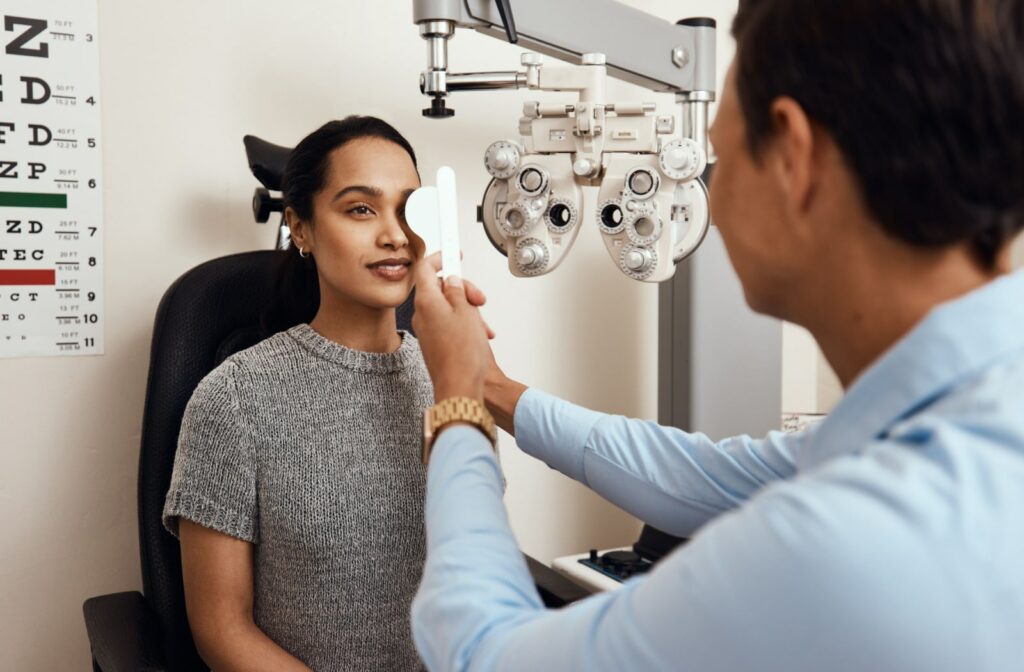Your vision is precious. It lets you see the world around you and all of the gorgeous sights it has to offer. This is why it’s so important to regularly visit your optometrist for a comprehensive eye exam. Eye exams let an eyecare professional thoroughly investigate your eyes and vision to determine if anything could be a problem.
If you’re between the ages of 20 and 64, you should see your optometrist at least once every 2 years. For adults over the age of 65 and those with diabetes, an annual visit is recommended. For children, it can be a little more complicated—the first exam should be around 6 months, another should be scheduled before starting school, and then annual visits are recommended until the age of 19.
Why Are Regular Eye Exams So Important?
Doing what we can to take care of our bodies is important. We try to eat the right foods to stay in shape, we exercise to stay healthy, and we visit a dentist to take care of our teeth—but what about our eyes?
Many people forget to regularly visit their optometrist, thinking it’s just about updating their prescription. If our vision is clear and we don’t have any problems, then why bother booking an eye exam? But eye exams are about a lot more than just checking your vision.
Your eyes are extremely complicated, and they don’t always clearly signal when something is wrong. During an eye exam, we can check for all kinds of different problems. From eye diseases to diabetes, your eyes showcase a lot more than you’d think—and we are looking for it all during your exam.
What Can an Eye Exam Detect?
During your eye exam, you may get several tests depending on your personal health and family health history. We’re not just going to ask you to read a chart on the wall and flick through some lenses—at least, that isn’t all we’re going to do.
We provide tests for conditions like:
- Glaucoma, a group of eye conditions that can progress slowly and damage the optic nerve, leading to permanent vision loss.
- Age-related macular degeneration, a condition that affects the part of the retina responsible for clear central vision.
- Certain types of cancer that affect the eye.
- Cataracts, the natural clouding of the eye’s normally-clear lens.
- Diabetes, as it can affect the blood vessels in the back of the eye and lead to several eye health problems.
We can even detect high cholesterol during an eye exam. We may also be taking measurements, checking how healthy your tear film is, and checking the overall health of your eye—both inside and out. We check everything that we can to gain a complete understanding of your eye health and visual clarity.
Signs That It’s Time for Your Next Eye Exam
So, how do you know if it’s time for your next eye exam? What are the rules for all of this?
There are a few guidelines that may be able to help. To start, any children in your family should have their first eye exam around the age of 6 months or so, then another before they start kindergarten. Afterward, they should visit an optometrist at least once a year until they’re 19.
Then you should generally aim for the following:
- Adults between the ages of 20 and 64 should see their optometrist at least once every 2 years
- Adults over the age of 65 and those with diabetes should visit their optometrist at least once every year
However, if you notice any irregularities, it doesn’t hurt to go more often! The human eye is incredibly complicated, so don’t let any unusual signs go unaddressed. Keep an eye out for:
- Frequent headaches or migraines
- Blurred vision or difficulty focusing on objects
- Difficulty seeing at night or in low light
- Sensitivity to light
- Dry eyes
If you notice any of these signs in yourself or a loved one, schedule your next eye exam to speak with an eye doctor.
What to Expect at an Eye Exam
When you go to the optometrist for your exam, there are a few steps to expect. It may start with a few quick questions, mostly about your family history and your current vision.
We ask these questions because your family history can play a big part in your vision. If you have a parent (or both) with nearsightedness, farsightedness, or other potential issues, you may have a higher risk of developing these conditions yourself. And if you’re recently experiencing any problems with your vision, we want to know.
Once you’re in the exam room, some of the tests we may provide include:
- A visual acuity test to determine your visual clarity
- A cover test, where 1 eye is covered while you focus on something distant
- A slit lamp exam where we can see your eye’s internal structure
- Tonometry, where we check the pressure in your eyes
- A depth perception test
We may dilate your pupils for some of these tests, and we may perform additional tests depending on your unique health risks. Remember, we’re trying to fully understand your eyes and their internal mechanisms. If you have any questions at any point, feel free to ask—we’re here to help you learn about your eyes too.
Book Your Next Eye Exam with Orchard Park Optometry
If you think it’s time for your next eye exam, come talk to us at Orchard Park Optometry. Our team is committed to providing comprehensive care for your eyes, and we’re ready to support your vision needs. Your eyes are precious, so book an appointment with our team today!




